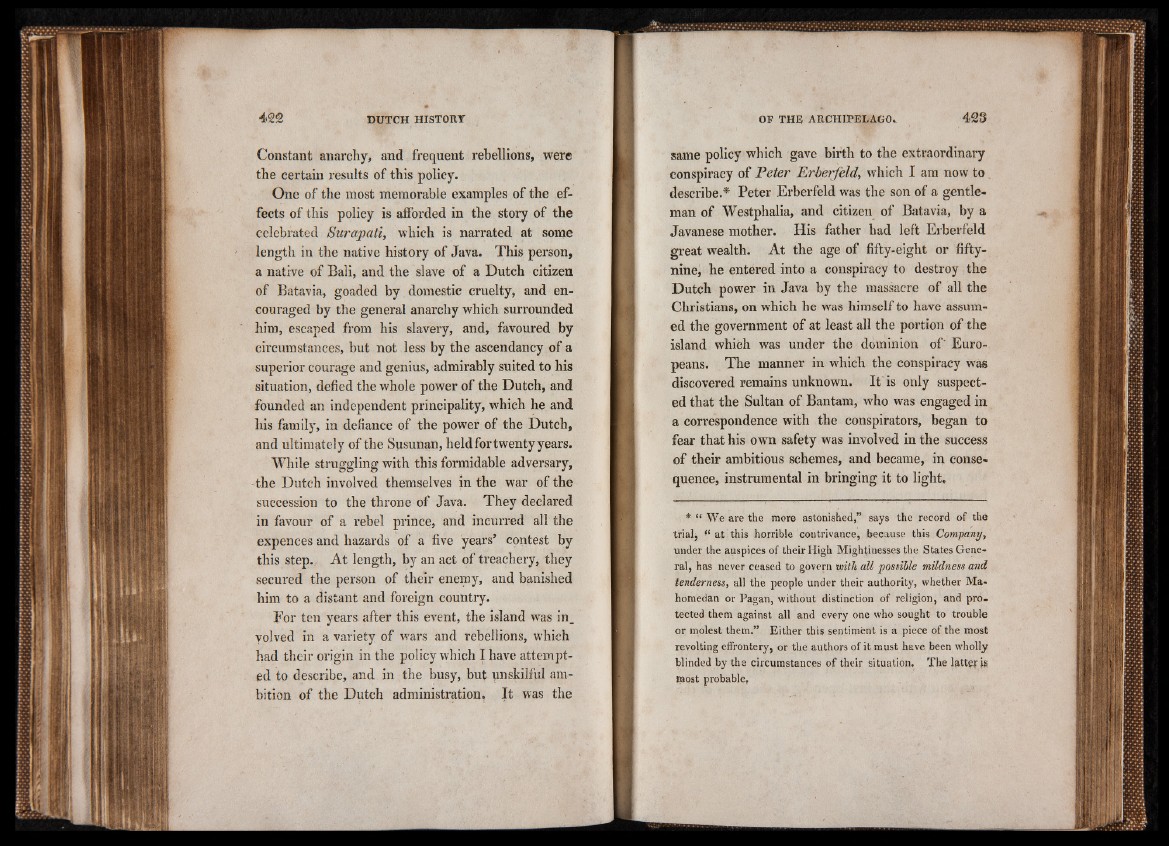
Constant anarchy, and frequent rebellions, were
the certain results of this policy.
One of the most memorable examples of the effects
of this policy is afforded in the story of the
celebrated Surapati, which is narrated at some
length in the native history of Java. This person,
a native of Bali, and the slave of a Dutch citizen
of Batavia, goaded by domestic cruelty, and encouraged
by the general anarchy which surrounded
him, escaped from his slavery, and, favoured by
circumstances, but not less by the ascendancy of a
superior courage and genius, admirably Suited to his
situation, defied the whole power of the Dutch, and
founded an independent principality, which he and
his family, in defiance of the power of the Dutch,
and ultimately of the Susunan, held for twenty years.
While struggling with this formidable adversary,
the Dutch involved themselves in the war of the
succession to the throne of Java. They declared
in favour of a rebel prince, and incurred all the
expences and hazards of a five years’ contest by
this step. At length, by an act of treachery, they
secured the person of their enemy, and banished
him to a distant and foreign country.
Tor ten years after this event, the island was in_
volved in a variety of wars and rebellions, which
had their origin in the policy which I have attempted
to describe, and in the busy, but unskilful ambition
of the Dutch administration, It was the
same policy which gave birth to the extraordinary
conspiracy of Peter Erberfeld, which I am now to
describe.* Peter Erberfeld was the son of a gentleman
of Westphalia, and citizen of Batavia, by a
Javanese mother. His father had left Erberfeld
great wealth. At the age of fifty-eight or fifty-
nine, he entered into a conspiracy to destroy the
Dutch power in Java by the massacre of all the
Christians, on which he was himself to have assumed
the government of at least all the portion of the
island which was under the dominion of Europeans.
The manner in which the conspiracy was
discovered remains unknown. It'is only suspected
that the Sultan of Bantam, who was engaged in
a correspondence with the conspirators, began to
fear that his own safety was involved in the success
of their ambitious schemes, and became, in consequence,
instrumental in bringing it to light.
* “ We are the more astonished,” says the record of the
trial, “ at this horrible contrivance, because this Company,
under the auspices of their High Mightinesses the States General,
has never ceased to govern with all possible mildness and
tenderness, all the people under their authority, whether Ma-
homedan or Pagan, without distinction of religion, and pro.
tected them against all and every one who sought to trouble
or molest them.” Either this sentiment is a piece of the most
revolting effrontery, or the authors of it must have been wholly
blinded by the circumstances of their situation. The latter ¡3
post probable,